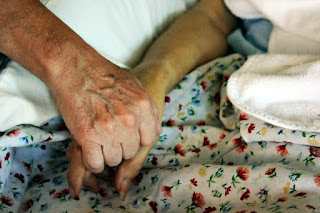The thing about being back in central New York, where I consider whatever roots I have to be, is that I immediately feel nostalgic about everything. Utica was once a lovely city, back in its glory days, but it has been reduced to a ghetto, rife with drugs, violence and prostitution. For the first time in my memory I was told not to go out after dark. But I felt at home anyway. I don’t know if it was the fresh bagels I ate for breakfast, the homemade lasagna I ate for lunch, the (real!) pizza I ate for dinner or the rich (but not too heavy!) cannole and tiramisú from Florentine’s that I ate for dessert, but it felt like I was home again after a very long trip.
During my stay at the hospice, I took a walk down Genesee Street with my grandpa. He’s a simple man who spent 55 years being married to a complex woman, and he’s still not one to be expressive about his feelings. But during our walk, he talked the whole time. Genesee Street is his turf, his and Gramma’s. He volunteered for many years at the food pantry just up a block, and she taught Sunday school at St. Francis, the local parish. As we walked, he pointed out all the places he used to frequent, and I remembered quite a few of them from when I was a little girl. I have fond memories of visiting him at the food pantry and helping him hand out stuffed grocery bags to the poor. It’s something I haven’t thought about in many many years, but the memories came flooding back. And I thought, gosh, my background and my heritage are so much richer than I realize.
My dad was born into a pure-blooded Italian-American family that stems from Calabria, Italy. My ancestors emigrated to central New York state at the start of the 20th century and most of their offspring have stayed in the area since then. Within the Trunfio clan (Gramma’s maiden name was Nancy Trunfio) there is the family restaurant (started by Gramma’s brother Mike), the gangster (Gramma’s dad, who sat in jail on two separate occasions for his penchant for boot-legging, ”But,” as Gramma always made sure to point out, ”he did it for his family.”), and the eccentric aunt (Gramma’s sister, a millionaire who looks like a homeless person). I come from these people. And I think it’s wonderful. We’re eccentric and dysfunctional, and we have enough quirks to feed the script for a family sitcom (”Everybody loves Nancy” anyone?).
I grew up as a third-culture kid. My dad is Italian-American, my mom is Swedish, and we lived in the United States until I was 22. My parents raised me on the road, so to speak. We traveled a lot and it’s now become my identity, the moving around, the traveling. I can’t conceive what it would be like to stay in one place. I haven’t lived more than three years in the same town/country since I was 16, and I love my transient life. So here comes my confession: I’ve kind of categorized my extended Italian-American family as small-town, simple folk. Like I said before, they grew up in central New York and have stayed put for three generations. But now I’m beginning to see that they stayed put so that I could roam free. They grew roots so that I could grow wings. They provided depth so that I could have breadth. That, my friend, is richness. And all this from taking a walk down Genesee Street....
